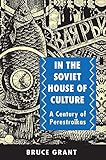In the Soviet House of Culture : A Century of Perestroikas / Bruce Grant.
Material type: TextPublisher: Princeton, NJ : Princeton University Press, [2021]Copyright date: ©1996Description: 1 online resource (248 p.) : 14 halftonesContent type:
TextPublisher: Princeton, NJ : Princeton University Press, [2021]Copyright date: ©1996Description: 1 online resource (248 p.) : 14 halftonesContent type: - 9780691219707
- Ethnology -- Russia (Federation) -- Sakhalin (Sakhalinskai︠a︡ oblastʹ)
- Gilyaks
- SOCIAL SCIENCE / Anthropology / General
- Ado-Tymovo
- Aleksandrovsk
- Battleship Potemkin
- Benjamin, Walter
- Brezhnev, Leonid
- Chaivo
- Chir-Unvd
- Churka, Aleksei
- Committee of the North
- Dostoevskii, Fedor
- Down with Illiteracy Society
- Engels, Frederick
- Evenki
- Far Eastern Republic
- Gorbachev, Mikhail
- Hawes, Charles
- Humphrey, Caroline
- Iuzhno-Sakhalinsk
- Karafuto
- Khrushchev, Nikita
- Kreinovich, Erukhim A
- Lazarev
- Manchuria
- Marx, Karl
- Nanaitsy
- Nekrasovka
- Nogliki
- Okha
- Pakskun, Grigorii
- Pogibi
- Romanovka
- Rybnoe
- Rybnovsk
- Soldiers of Culture
- Tengi
- Udegeitsy
- Vereshchagino
- culture bases
- 305.8/009577 22
- DK759.G5 G7 1995eb
- online - DeGruyter
| Item type | Current library | Call number | URL | Status | Notes | Barcode | |
|---|---|---|---|---|---|---|---|
 eBook
eBook
|
Biblioteca "Angelicum" Pont. Univ. S.Tommaso d'Aquino Nuvola online | online - DeGruyter (Browse shelf(Opens below)) | Online access | Not for loan (Accesso limitato) | Accesso per gli utenti autorizzati / Access for authorized users | (dgr)9780691219707 |
Frontmatter -- Contents -- List of Illustrations -- Preface -- Acknowledgments -- Note on Transliteration and Terminology -- List of Abbreviations -- One Introduction -- Two Rybnoe Reconstructed -- Three Nivkhi before the Soviets -- Four 1920s and the New Order -- Five The Stalinist Period -- Six 1960s Resettlements and the Time of Stagnation -- Seven Perestroika Revisited: On Dissolution and Disillusion -- Eight Conclusions: The Subjects Presumed to Know -- Appendix "A Recently Discovered Case of Group Marriage," by Frederick Engels -- Notes -- Bibliography -- Index
restricted access online access with authorization star
http://purl.org/coar/access_right/c_16ec
At the outset of the twentieth century, the Nivkhi of Sakhalin Island were a small population of fishermen under Russian dominion and an Asian cultural sway. The turbulence of the decades that followed would transform them dramatically. While Russian missionaries hounded them for their pagan ways, Lenin praised them; while Stalin routed them in purges, Khrushchev gave them respite; and while Brezhnev organized complex resettlement campaigns, Gorbachev pronounced that they were free to resume a traditional life. But what is tradition after seven decades of building a Soviet world? Based on years of research in the former Soviet Union, Bruce Grant's book draws upon Nivkh interviews, newly opened archives, and rarely translated Soviet ethnographic texts to examine the effects of this remarkable state venture in the construction of identity. With a keen sensitivity, Grant explores the often paradoxical participation by Nivkhi in these shifting waves of Sovietization and poses questions about how cultural identity is constituted and reconstituted, restructured and dismantled. Part chronicle of modernization, part saga of memory and forgetting, In the Soviet House of Culture is an interpretive ethnography of one people's attempts to recapture the past as they look toward the future. This is a book that will appeal to anthropologists and historians alike, as well as to anyone who is interested in the people and politics of the former Soviet Union.
Mode of access: Internet via World Wide Web.
In English.
Description based on online resource; title from PDF title page (publisher's Web site, viewed 30. Aug 2021)


